Tempered Hope for COP30
Air Date: Week of July 4, 2025
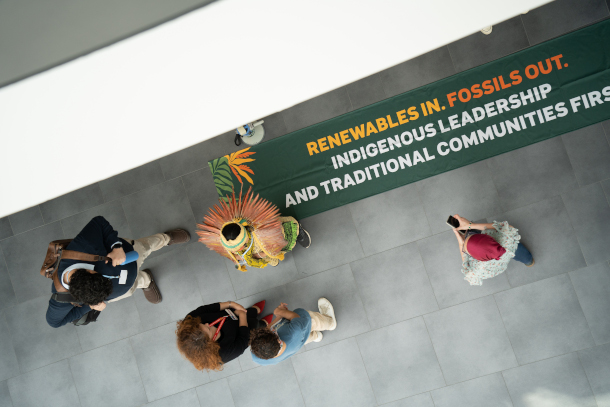
Climate negotiators met for two weeks of technical talks in the German city of Bonn, seeking to move forward on critical issues before COP30 in Brazil. (Photo: Lara Murillo, UN Climate Change, Flickr, CC BY NC SA 4.0)
Ten years since nations adopted the historic Paris Agreement, greenhouse gas emissions continue to rise, and hopes are dimming that we can meet the Paris goal of limiting global heating to 1.5 degrees Celsius. As global leaders prepare to meet in Brazil for COP30, some say the entire UN climate agreement system is broken. Preliminary sessions recently took place in Bonn, Germany where longtime UN climate observer and Senior Associate at E3G Alden Meyer was in attendance, and he joins Host Aynsley O’Neill.
Transcript
O’NEILL: At the 2015 UN Climate Change Conference, nearly 200 nations pledged to limit global heating to 1.5 degrees Celsius above preindustrial levels, resulting in the historic Paris Agreement. Climate scientists have long warned that past those 1.5 degrees, humanity risks even more dangerous heatwaves, droughts, and sea level rise, as well as catastrophic tipping points such as the loss of massive ice sheets in Antarctica and Greenland. Now it’s been 10 years since Paris, and we are not on track to meet its crucial goals. Mitigation efforts to reduce the greenhouse gas emissions we are pumping into the atmosphere, as well as to support healthy ecosystems that can soak up some of these emissions, are not happening nearly fast enough. Meanwhile, adaptation efforts like flood defenses, early warning systems for cyclones and switching to drought-resistant crops, are also falling behind. As global leaders prepare to meet in Belem, Brazil this November for COP30, some say the entire UN climate agreement system is broken. Preliminary negotiations recently took place in Bonn, Germany where longtime UN climate observer and Senior Associate at E3G, Alden Meyer, was in attendance. He joins us now. Alden, welcome back to Living on Earth!
MEYER: Thanks, Aynsley, it's great to be with you again.
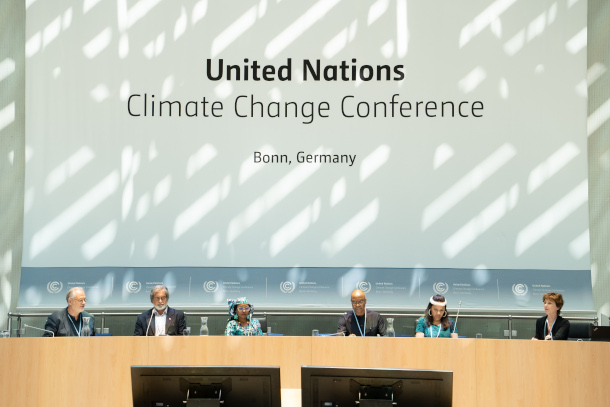
Over 5,000 government delegates and stakeholders gathered in Bonn, Germany for the Bonn Climate Change Conference that took place from June 16 - 26, 2025. (Photo: Lara Murillo, UN Climate Change, Flickr, CC BY NC SA 4.0)
O'NEILL: So Alden, what was the mood during these preliminary climate talks that took place in Bonn, Germany?
MEYER: Well, it was typical in the sense that they're pretty contentious talks. The issue of climate finance especially was present across all the negotiating rooms. There was a two-day agenda fight at the beginning of the meeting, which held up negotiations until Wednesday of the first week. But there was also, I think, seriousness of purpose. People got down to business. Once the negotiations started, they produced draft texts across most of the negotiation spaces. That doesn't mean they're in agreement. There's a lot of different options and a lot of divisions, but they did produce a product that can be built on, and the Brazilian incoming Presidency of COP 30 and Belem can use as a basis for work at the political level by ministers and leaders over the coming months to try to resolve some of those differences.
O'NEILL: You know, I think it's fair to say that even just in the first half of this year we have seen a series of climate catastrophes, fires in Canada, floods in Nigeria. So what was discussed at the Bonn talks in terms of adaptation, in terms of maybe finance and support?
MEYER: Well, one of the major issues under negotiation is what's called the global goal on adaptation, which is mandated to be decided in COP 30 and Belem, and they're trying to refine a list of indicators of how you measure progress in building up resilience and increasing the capability of, of countries to deal with these mounting climate impacts. One of the more contentious issues there was the provision of climate finance, particularly by developed countries. You may remember at the COP in Glasgow, four years ago, developed countries committed to try to double finance for adaptation investments by developing countries, from then 20 billion a year to $40 billion a year this year. There are some developing countries, the least developed countries are calling for a tripling of that amount to $120 billion a year by 2030. Of course, there was no agreement on that. In fact, predictions are now that the amount provided by developed countries may actually go down a little bit next year, compared to 2025. So this is a real issue that's going to have to be grappled with at the political level because I think if there's not progress on mobilizing more finance for adaptation and for loss and damage to go into the fund that was created at the COP in Sharm El Sheik a few years ago, it's going to weaken trust between developed and developing countries.
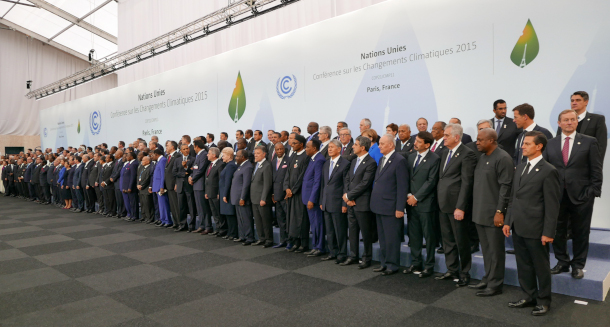
Heads of delegations at the 2015 United Nations Climate Change Conference (COP21), which led to the signing of the Paris Agreement. (Picture: Presidencia de la República Mexicana, Wikimedia Commons, CC BY 2.0)
O'NEILL: And United States negotiators were not present at Bonn. What impact did that absence have on the talks?
MEYER: Well, yeah, this is the first time in the over 30 years I've been following this process since it began before the Rio Earth Summit in 1992 where the United States was not represented at all in the process. Even during President Trump's first term, there were robust US delegations participating in the negotiations. It had a couple of impacts. First of all, I think at one level, other countries may have been a little relieved that the Trump administration was not represented at the political level because of the actions they've been taking in other multilateral forums across the world, but they did miss the professional civil service negotiating team that has tremendous expertise and skill in the negotiations and often was helping to try to find some ways to resolve differences and, and I heard that from a number of negotiators in Bonn that that absence was definitely felt. It had the impact that the European Union, for example, was now the frontline developed country delegation in terms of taking leadership on issues like climate finance, like trade and unilateral measures, like the mitigation negotiations and I think that was a little maybe unexpected or uncertain for them. They took a little while to find their sea legs, so to speak, and be able to step into that role. So it does have implications and of course, everyone's wondering, will the Trump administration again vacate the field at COP 30 in Belem, or will they send a political delegation from the administration and if they do, what will their objectives and behavior be? And no one really knows the answer to that question, maybe not even the Trump administration itself.
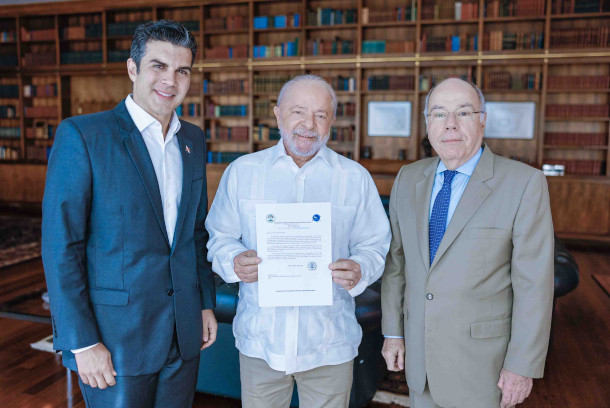
Brazilian Governor of the State of Pará, Helder Barbalho (left), President of the Republic, Luiz Inácio Lula da Silva (center), and Minister of State of the Ministry of Foreign Affairs, Mauro Vieira (right), announced the City of Belém, as the host city of COP 30. (Photo: Ricardo Stuckert, Wikimedia Commons, CC BY 2.0)
O'NEILL: And as I understand it, there have been talks about changing the UNFCCC process. Where does that conversation stand?
MEYER: Well, there are several levels of that. There are reforms within the current rules that are being discussed, things like increasing the effectiveness of participation, of observers, indigenous peoples, youth, civil society. There are discussions about ways to increase the transparency of attendance by the fossil fuel industry and others with potential conflict of interest. There are discussions about how to reform the efficiency of the process, streamline the agenda, reduce the number of technical negotiating items. There's also much bigger conversations that are happening, as we have now completed most of the negotiations over the rule book for the Paris Agreement, and we really need to shift into implementing what we've already agreed. And in that kind of world, the division between parties, the so called countries represented in this process, and observers, civil society, business investors, cities, states, etc, doesn't make a lot of sense. In the real world, all those actors are key to implementing the changes we need and so we need to also engineer a culture shift in the way this process operates to generate radical collaboration of the kind that we've seen among some of the sub national actors over the last decade or so, and create a culture of cooperation, collaboration, supporting each other, learning from experience, both good and bad, sharing those lessons, rather than finger pointing and zero sum bargaining, which characterizes the negotiation space. And I think Brazil is trying to do that with their presidency. They've called for a global mutirão which is based on an indigenous phrase in Brazil, which basically means everyone coming together to achieve big things, whether that spirit and culture will really permeate the talks in Belem, remains to be seen. That is a huge shift in mindset, especially with all the geopolitical tensions that we see now, the conflicts, the trade wars, the security concerns, the divisions between countries. That's a pretty big lift, but they are trying to infuse that mutirão spirit into the entire process.
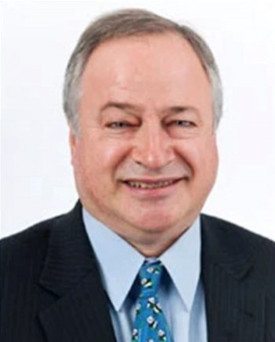
Alden Meyer is a Senior Associate at E3G working on US and international climate policy and politics. He is a Principal at Performance Partners, which provides a range of consulting services to clients in government, business, and the non-profit sector. (Photo: Courtesy of Alden Meyer)
O'NEILL: Alden, from your perspective, what needs to be done, not just at COP 30 later this year, but in these future climate talks for decades to come?
MEYER: Well, we're now at the 10th Anniversary of the agreement in Paris on the Paris Agreement, and Brazil is framing this in terms of a decade of implementation, forward to 2035. What happens after Bonn is lifting this up to the political level, the Leaders Summit that the Secretary General will convene in New York in September during the opening of the UN General Assembly, the Leaders Summit that Brazil intends to convene just before the COP opens in Belem in November, consultations with ministers to try to resolve some of the deadlock on key issues like climate finance and mitigation ambition and adaptation and loss and damage. The bigger issue, I think, is how this process can drive collaboration and ambition across a whole range of other spaces, whether it's the G20, the Clean Energy Ministerial, the IMF and the World Bank annual meetings, other spaces which are outside the formal climate process, but which need to be deeply engaged and involved if we're going to roll up our sleeves and really address this crisis. And that is where I think Brazil is driving with the action agenda, as well as with the roadmap to $1.3 trillion that they intend to put forward in Belem, because reaching those kind of goals is not something that climate negotiators can deliver on their own. It involves finance ministers, it involves leaders, it involves investors in the private sector, and everyone's got to come together to achieve that level of ambition. So hopefully we will come out of here with little more clarity about who needs to do what and how to pull it all together, but there will be a lot more work to do after COP 30 adjourns in Belem.
O'NEILL: Alden Meyer is a Senior Associate at E3G, working on US and international climate policy and politics. Alden, as always, thank you so much for taking the time with me today.
MEYER: I very much enjoyed it.
Links
E3G | “E3G Media Briefing – Insights and Outcomes for Bonn as Key Milestone on Road to COP 30″
Carbon Brief | “Bonn Climate Talks: Key Outcomes From the June 2025 UN Climate Conference”
Living on Earth wants to hear from you!
Living on Earth
62 Calef Highway, Suite 212
Lee, NH 03861
Telephone: 617-287-4121
E-mail: comments@loe.org
Newsletter [Click here]
Donate to Living on Earth!
Living on Earth is an independent media program and relies entirely on contributions from listeners and institutions supporting public service. Please donate now to preserve an independent environmental voice.
NewsletterLiving on Earth offers a weekly delivery of the show's rundown to your mailbox. Sign up for our newsletter today!
 Sailors For The Sea: Be the change you want to sea.
Sailors For The Sea: Be the change you want to sea.
 The Grantham Foundation for the Protection of the Environment: Committed to protecting and improving the health of the global environment.
The Grantham Foundation for the Protection of the Environment: Committed to protecting and improving the health of the global environment.
 Contribute to Living on Earth and receive, as our gift to you, an archival print of one of Mark Seth Lender's extraordinary wildlife photographs. Follow the link to see Mark's current collection of photographs.
Contribute to Living on Earth and receive, as our gift to you, an archival print of one of Mark Seth Lender's extraordinary wildlife photographs. Follow the link to see Mark's current collection of photographs.
 Buy a signed copy of Mark Seth Lender's book Smeagull the Seagull & support Living on Earth
Buy a signed copy of Mark Seth Lender's book Smeagull the Seagull & support Living on Earth

